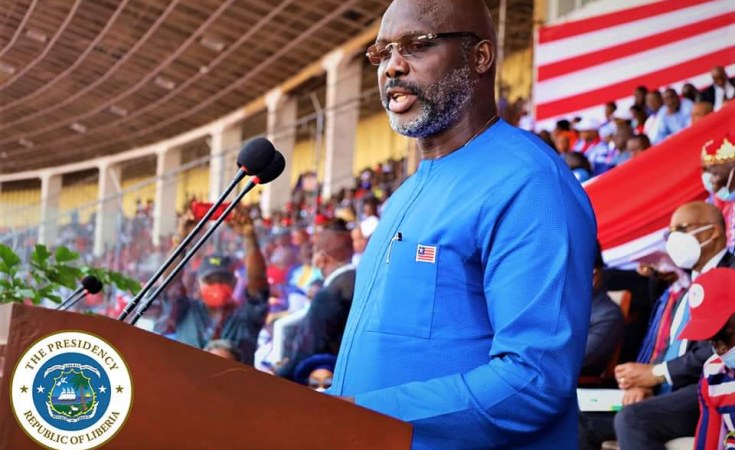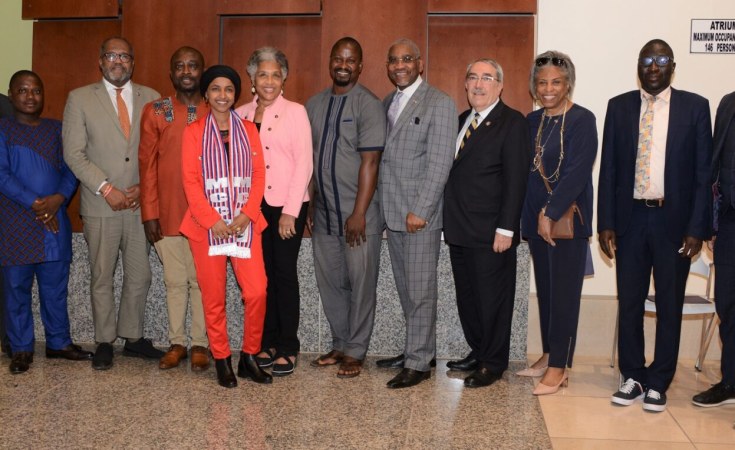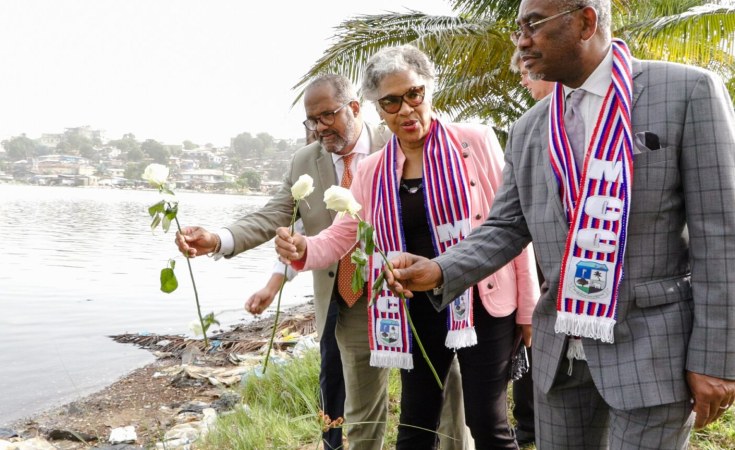Monrovia — Liberia is marking the country's founding as an independent nation in 1822 when the first group of previously enslaved African Americans arrived from the United States. "Our shared history is uncommonly unique and exceptional," President George Weah said in an address on February 14 during the ceremony that launched a year-long bicentennial commemoration. "Today we celebrate 200 years since we first began the journey to become a sovereign state, eventually to become the first African country to be established as an independent Nation."
The presidents of The Gambia, Niger, Sierra Leone and Togo and the Nigerian vice president attended along with former Liberian President Ellen Johnson Sirleaf and a U.S. Presidential delegation headed by Dana Banks, Senior Director for Africa at the National Security Council.
The government has said the bicentennial commemoration is intended "to reclaim Liberia's leadership role in Pan-Africanism" and deepen U.S.-Liberia historic ties, while forging stronger economic and social bonds between both peoples.
The American Colonization Society, which was founded in 1817 to relocate free black people to Africa, had high-powered supporters. The first president was Bushrod Washington, whose uncle was the first U.S. president. Other former presidents were listed among the supporters, including Thomas Jefferson, James Madison and the then-incumbent James Monroe, for whom the capital is named. The first arrivals from the United States were transported to the Providence Island in Monrovia, which now serves as a stark reminder of Liberia's foundation and the country's link to America, as do the flag and constitution which closely resemblance their U.S. equivalents.

The delegation sent by President Biden included Lonnie G. Bunch III, Secretary of the Smithsonian Institution and the Rev. Dr. Teresa Jefferson-Snorton, Bishop of the Christian Methodist Episcopal Church and current chair of National Council of Churches in the United States. Linda Thomas-Greenfield, the U.S. Ambassador to the United Nations who previously served as ambassador in Libera, had to cancel her planned attendance when war broke out in Ukraine.
President Lincoln recognized Liberia as a sovereign nation in 1862, Dana Banks said in her remarks at the Bicentennial launch. "160 years later, President Biden remains committed to the U.S.-Liberian relationship." She said the President sent the delegation "to demonstrate the unique bond that the United States shares with the founding of Liberia".
She called the American Colonization Society "a racist project" whose efforts to remove free Black people from America nevertheless resulted in "the deep, strong, historical ties between the United States and Liberia – the very ties we are here today to reflect upon and commemorate."
Tens of thousands of Liberians packed the national stadium for the launch. They were there too to view historical and cultural artifacts and musical performances. The country has suffered a lot ever since independence in 1847. A military coup in 1980 ended the more than a century of rule by Americo-Liberians. More than two decades of political turmoil followed, including a bitter civil war that killed a quarter of a million people and displaced thousands more.

But Liberians are resilient. The country is now one of Africa's most stable democracies, rebuilding its institutions and conducting free and fair elections - including the historic vote in 2017 that ushered a peaceful transfer of power from Africa's first elected female head of state, Ellen Johnson Sirleaf to Weah, the current president.
There still exist simmering tension between the Americo-Liberian elites and those whose ancestors were here when the American came. And tension also persists among the 16 ethnic groups that comprise the indigenous population – some 95 percent of the total. It was in recognition of these tensions that Weah used the occasion to call for unity. "Let us reinforce and strengthen the common heritage that unites all of us, both the descendants of the indigenous people and the descendants of the settlers" he said. "We are One People, with One Destiny."
"As we recollect, review and re-examine these first two hundred years", the Liberian leader said, "we cannot help but wonder what motivated our forefathers to break the chains of bondage and slavery in order to seek a land where they could experience the benefits of freedom irrespective of color, creed or religion".

Highlighting the country's historical relationship with the United States, he added: "This converging of people from various backgrounds and localities eventually led to the founding of the country that we all now know and love as the Republic of Liberia." He said Liberians from diverse backgrounds shared a national identity. "This commemoration must therefore bring us closer together, and strengthen our national unity, even as we recognize and celebrate our diversity."
The president also outlined what is required "to ensure that Liberia is a better place." His list began with fighting climate change and included rural-urban migration, housing, sanitation, health and educational facilities and "affordable and reliable electricity" and a national road network.
Further underlining the strength of bilateral ties, a seven-member delegation from the U.S. House of Representatives visited Monrovia a week after the bicentennial launch. Led by Gregory Meeks (New York), who chairs the powerful House International relations Committee, the delegation included Ami Bera (California), Ilhan Omar (Minnesota), Joyce Beatty (Ohio), G.K. Butterfield (North Carolina), Brenda Lawrence (Michigan) and Troy Carter (Louisiana).
"We come in recognition of the 200 years of Liberia's existence as you commemorate the Bicentennial, and we pledge to work with you to ensure continued progress in the country's development and democracy," Meeks told Weah in their meeting at the Executive Mansion. The Congress members also visited Providence Island and Providence Baptist Church, one of three Liberian churches founded by the American immigrants and location where the Liberian Declaration of Independence was signed.

Throughout the coming year, other planned events to commemorate the bicentennial include an investment forum and a day set aside to recognize African Liberation and Liberia's history of pan African leadership.
Currently, the international ship, Logos Hope , carrying the world's largest floating bookfair is docked in Monrovia. Operated as part of a Christian missionary outreach program, the ship is offering a selection "at affordable prices" of over 5,000 different titles covering a variety of subject of books and is open for tours with interactive displays.
Boakai M. Fofana is Liberia's Deputy Minister of Information. From 2007 to 2018, he was a senior editor and AllAfrica Bureau Chief based in Monrovia.
More on Liberia from the AllAfrica archive
Impoverished Hard-Hit Area Points to Ebola Recovery [2016]
Liberia Keeps Its Foot on the Pedal to End Ebola [2014]
Companies Tackle Escalating Ebola Crisis [2014]
'You Ain't Know Ebola in Town?' [2014]
Fighting for Liberia's Future – One Issue at a Time [Ellen Johnson Sirleaf]
Liberians Welcome President's Pledge to Curb Corruption, Create Jobs [2006]
Liberia: A Casualty of the Cold War's End [1985]


